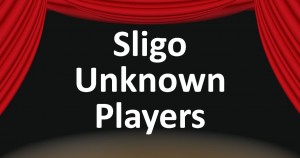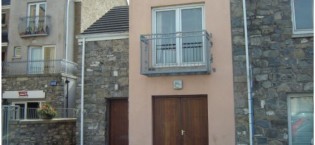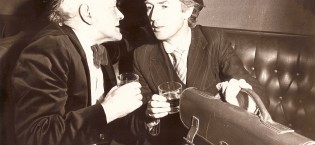An Unknown Player Looks Back
 When stage people in Sligo presented “The Colleen Bawn” shortly before Christmas as a tribute to Charlie and Maggie Hughes it gives one the opportunity of reminiscing on the Sligo Unknown Players to which the Hughes partnership were so much attached over a period of many years. It was just after Christmas in 1935 that I first became associated with this amateur drama group whose fame spread far and wide long before the present day Drama Festivals existed. Only a few months before, I had joined the staff of “The Sligo Champion” as a very cub reporter. And then Jim Wynne, – Producer of the Players at the time – was staging “Blind Man’s Buff”, a translation from the German original by Ernest Toller.
When stage people in Sligo presented “The Colleen Bawn” shortly before Christmas as a tribute to Charlie and Maggie Hughes it gives one the opportunity of reminiscing on the Sligo Unknown Players to which the Hughes partnership were so much attached over a period of many years. It was just after Christmas in 1935 that I first became associated with this amateur drama group whose fame spread far and wide long before the present day Drama Festivals existed. Only a few months before, I had joined the staff of “The Sligo Champion” as a very cub reporter. And then Jim Wynne, – Producer of the Players at the time – was staging “Blind Man’s Buff”, a translation from the German original by Ernest Toller.
To add realism to the court scene Jim wanted a stenographer. Why he picked on me I shall never know. But that was my introduction to the amateur stage in Sligo. I can recall some of the cast of that play which was staged in the Town Hall. There was Sheila Cosgrove (nee Foley) who played one of the leads. Harry Thompson, then a member of the staff of the Hibernian Bank in Sligo, who later joined the Defence Forces during the emergency period, appeared too. There was the late and always lamented Joe Burns – not the Joe with whom I teamed up later – but the Joe of the P. J. Gaynor play “The Young Fellow”. I shall always remember his appearance in the witness box of the court scene in “Blind Man’s Buff being ruthlessly cross-examined by Ronald Perry for whom at that time we very amateur actors had more than the greatest respect, for, after all, had not Ronald been then a professional turned amateur under the persuasion of Jim Wynne.
I think, too, that the cast of “Blind Man’s Buff” had, amongst its members, Jack Condy, then a member of staff of Messrs. Henry Lyons and Co. Ltd., now working in Cheltenham, England, and still retaining more than a passing interest in the amateur stage if I can judge by the few remarks he made to me when I met him in Wine Street a few summers ago when Jack was home on a very welcome return visit to his native Sligo. I know I could turn back the files of “The Sligo Champion” and have my memory refreshed, but I prefer to reminisce from my mind in this little story of my first associations on the stage with those wonderful people, Charlie and Margaret Hughes.
Because in the next play Jim Wynne decided upon, I was cast as Margaret’s husband. Vividly I can recall my experience as Major Petkov in “Arms and the Man”, the George Bernard Shaw play which the redoubtable Jim decided would be his show for the year following his successful “Blind Man’s Buff”. The Shavian piece had Jill Noone cast in the leading role with Harry Hallowes – who incidentally was one of the last night ld-timers to pay tribute to Charlie and Margaret in “The Colleeen Bawn” – appearing as “The Chocolate Soldier”. Rita O’ Beirne (nee Mc Lynn) was also in the cast, while in a most obsequious man-servant was Herbert Hughes, then a Sergeant in the Guards in Sligo.
Jim, the Producer, always had his eye on publicity. How could it be otherwise, for “Rex” was in those days a newspaper man himself, and I recall one with a biting tongue and a penetrating pen – or was it a typewriter? He decided to send an invitation to the “Irish Independent” asking them to send their drama critic to review “Arms and the Man”. And of course he came. None other than David Sears, who will be remembered for writing “Juggernaut”. David arrived to see the Monday night show – the play opened the previous night with what is for most shows hereabouts an opening night that is a dress rehearsal.
Walrus moustached and pillow stomached, my Major Petkov did not greatly impress David. I still recall that the following Tuesday morning’s “Irish Independent” reported me as playing the role of the Major as “rather a stock character, which was not too complimentary to Shaw”. But I learned as I went on. And for that I must say thanks to my “Arms and the Man” wife – Margaret Hughes. There was heartening encouragement too that I received second-hand from Alfie Rochford, who was sitting beside my real wife for my Major performance and who whispered – “he has something but he’s got a lot to learn”. That, coming from Alfie Rochford, was praise indeed.
Which of course brings me in these meandering musings to “Autumn Fire” – the T. C. Murray masterpiece which made the name and the fame of the Unknown Players. Here, I gladly link Tubbercurry and Sligo. For it was these two towns which provided the artistes for this wonderful show. Alfie’s “Owen Keegan” was a portrayal that must surely live in the memory of all those people who saw it just as it does in mine. Who can ever forget Margaret Hughes as “Ellen” – a performance that must surely rank among the truly greats of amateur acting in Ireland. This was a wonderful show. There was Jill Noone as Owen’s young wife. And there was the moving sincerity of Tubbercurry’s Bill Gallagher as Owen’s brother “Morgan”.
I well remember the night we played in he Father Matthew Hall, Dublin – it was, of course, at the Father Matthew Feis, long before the Amateur Drama Council, with its spate of provincial festivals was ever heard of. That night the Unknown Players gave one of their greatest ever performances of “Autumn Fire”. My job was prompter and Assistant Stage Manager, and even now I am not ashamed to admit hat in that last scene where the broken-hearted Owen slowly fingered his rosary in front of the fading firelight, I lost touch with my prompter’s script, for tears filled my eyes. When Alfie’s artistry so affected me I’ve often thought what the reaction of the audience must have been on that night which was to end in yet another triumph for those gifted people who in those days brought renown to Sligo and its Unknown Players.
From melodrama and mere tragedy, my thoughts turn to the comedy, the laughter and the fun of “Professor Tim”. Here again we had Rochford at his best. But, just as in “Autumn Fire”, it was no one-man show. For again we had Margaret, Jill Noone and Bill Gallagher, the henpecked husband, who was best described as “only a scarecrow on his own farm”. Sad it is, that in recalling this show of laughs I remember the vivacity of Hannah Wynne, whose death so saddened all us old Unknowns, particularly Alf Rochford and Ronald Perry, to whom she played so often as the second voice from the wings. No better prompter could any company have ever had. Another show well worth recalling was Emlyn William’s “Night Must Fall”. As the wheel-chaired “Mrs. Bramson” Margaret Hughes was brilliant. “Danny”, needless to say, was played by Alf Rochford – one of the meatiest parts written for many years. Jill Noone was “Olivia” and Elma Lambert (nee Jinks) was the saucy “Dora”.
In those days dramatic competitions were one of the highlights of Feis Shligigh. Indeed midnight matinees were quite the usual thing, and so it was that one May Eve the Unknowns staged the Yeats one-act “Land of Heart’s Desire”. The play is set in Kilmacowen – the time happens to be May Eve, and as I made-up that night to ply the role of the Monk I assured the cast we couldn’t miss – even though the adjudicator was the lean, lanky and late lamented Lennox Robinson. I was right, of course – we won, and in that production Jill Noone gave one of her loveliest performances as the Faery Child.
Back again to the three actors. This time “The Passing Day”. Big Joe Burns had a tremendous part as “Fibbs”, the shop keeper, whose conscience caught up with him while his wife, played by Margaret, went off for a holiday. This was a ply with a difference as far as stage technique in Sligo was concerned. For those who saw it will recall there was a dream sequence for which producer Jim decided we must use a gauze curtain. And how we stage hands cum actors cursed the blasted thing each night during the run in the Town Hall.
The years pass and the Unknown Players compete with films in a big way. How it comes about is that we staged St. John Irvine’s “Boyd’s Shop” in the Savoy Cinema I was cast as Andrew Boyd, and one of my best recollections of the play is the lovely performance of Maureen Hughes, formerly of Adelaide Street, now in foreign parts, and who, though I am not too sure, was possibly my stage daughter. Then we had the stupendous Shiels success. “The Rugged Path” . Charlie, of course, was producing now, having taken over from Jim. “The Rugged Path” was a fabulous show. Dan Mc Cormick – ex Church Street, now Galway, played “Marcy” while Mark Thornton’s “Hugh Dolls” was yet another memorable performance.
I know I have not mentioned all those who are proud to be old Unknowns. There was, for instance, Peter Carroll of Grattan Street, and Brian Mc Donagh was a useful back-stage boy in those days, a quarter of a century ago. As time went by I fear I lost my interest in the “legit”. But still I enjoyed the Unknowns, with new people in “Arsenic and Old Lace”, “Charley’s Aunt” and “Anastasia”. And all the while Charlie and Margaret Hughes were the backbone of the Unknown Players. Now they have retired. What is to become of a company whose name must always be linked with the Amateur Drama Movement in Ireland long before the Festival craze arose? For us old Unknowns it becomes really tragic if the company with which we had so many pleasant associations must now fade into oblivion just because the curtain has fallen for the last time on two whose names must always be remembered in Sligo whenever a play is staged – Charlie and Margaret Hughes.
from The Sligo Champion, by T.P., January 27th, 1962
Tags: History, Unknown Players






